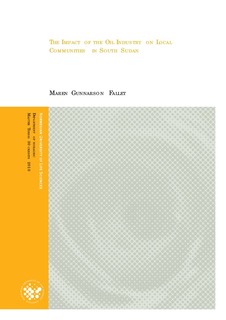| dc.description.abstract | This master thesis investigates the impact of the oil-industry on the local communities in Block 5A, Sudan. During the war the people here experienced harassment, attacks and forced displacement because the central government and oil-companies wanted to access the black gold underneath. The Comprehensive Peace Agreement (CPA) ended the over twenty year long civil war in Sudan. Here it is stated that the local communities living in vicinity to oil-extraction areas shall benefit from the oil-industry. This research maps the impact of oil-industry today and whether the statements in the CPA regarding the oil-industry are being followed. It also maps knowledge and expectations of the local communities towards the oil-industry. The research is of qualitative character based on interviews with 40 respondents in 5 villages proximate to oil-extraction areas. In addition it looks at the greater aspect of the link between war and natural resources in post-CPA time in Sudan. The local communities benefit from oil-revenues given through local government and from development projects from the operational company in Block 5A; White Nile Petroleum Operation Company (WNPOC). While prior to the CPA they had no access to schools, health care or infrastructure, most of the respondents today utilize some access. However, the negative effects from the oil-industry outweigh the positive outcomes, mainly because of contamination of drinking water caused by oil-operations. This has devastating consequences for the people here, and therefore undermines the positive development. They also experience illness caused by the smoke originating from drilling-areas, and accidents due to irresponsible road-construction. They don’t participate in decision-making regarding oil-industry, nor are they given a just compensation for previous wrongdoings as the CPA states. The level of knowledge about the oil-industry and the CPA is very low, and so are the expectations of potential benefits. The oil also contributes to destabilising the fragile post-war situation in Sudan due to the negative effects of natural resource dependency. Oil still acts like a curse for the local communities in Block 5A rather than a blessing. However, if the statements of the CPA are being followed, the oil has huge potential for promoting development and sustainable peace in Sudan. | en_US |
